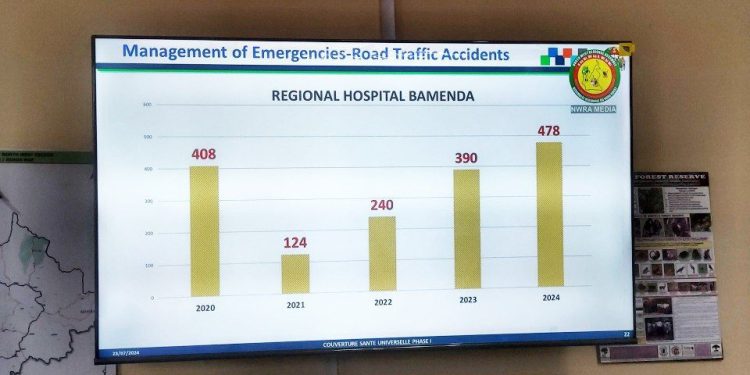The North West Region of Cameroon is grappling with a disturbing increase in road traffic accidents – raising serious concerns among residents and local officials. At the recent opening of the 15th session of the North West Regional Assembly, Kingsley Che Soh, the Regional Delegate for Public Health, presented sobering statistics that highlight the severity of the situation.

Statistics show that the Bamenda Regional Hospital received 408 cases of road traffic accidents in 2020, 124 in 2021, 240 in 2022, 390 in 2023, and a staggering 478 cases in 2024 alone. The first half of 2024 alone saw 4,114 road traffic accidents across the region, with 63 fatalities recorded. These numbers reflect a disturbing trend that has resulted in widespread concern.
Local road users attribute the high accident rates to multiple factors, including the poor condition of the roads and inadequate driver training. Kum, a bike rider along the Bamenda-Wum road, highlighted the challenges faced by motorists: “The very bad state of the roads is a big challenge for us.” This sentiment is echoed by many, as the region’s infrastructure struggles to accommodate the growing volume of traffic.
Also, there is a notable concern about the lack of formal training among drivers. A resident of Bamenda expressed frustration, saying, “We find a situation where people get up in the morning and start washing vehicles, and by evening they become drivers. How will they not have accidents?” This lack of proper driver education and licensing is seen as a significant contributor to the increasing number of accidents.
Another critical issue is the poor condition of vehicles on the roads. Abanda, a fast food vendor in Nkwen, pointed out the lax enforcement of vehicle safety standards: “You see some vehicles driving past security checkpoints with their tires all worn out. Why will there not be many accidents?” The prevalence of poorly maintained vehicles exacerbates the risk of accidents, putting both drivers and passengers in danger.
Across the region, calls for state institutions to take decisive action are rife. Residents believe that stricter regulations, good road maintenance, and improved driver training are essential to reversing this trend. The call for more intentional and proactive measures is growing louder, as the safety and well-being of the region’s residents hang in the balance.



